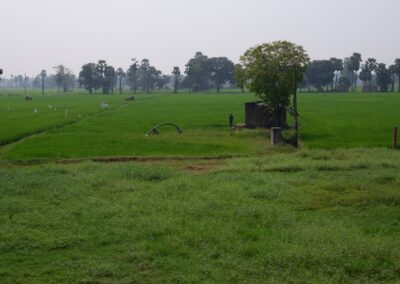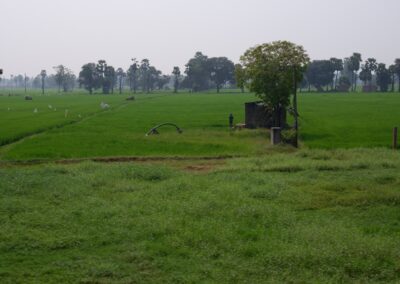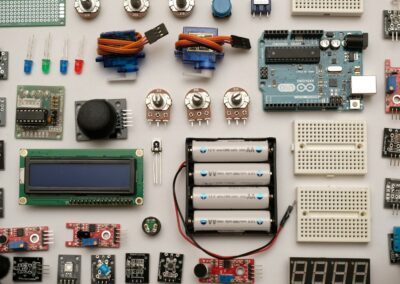Challenges in Securing Smart Irrigation Systems
The Rise of Cyber Threats in Smart Irrigation
The increasing adoption of smart irrigation systems in regions like Saudi Arabia and the UAE has revolutionized water management by enhancing efficiency and sustainability. However, this technological advancement also brings about significant cybersecurity challenges. Smart irrigation systems, which rely on Internet of Things (IoT) devices, sensors, and AI algorithms, are vulnerable to cyberattacks. These systems are often interconnected with broader smart city infrastructures, making them attractive targets for cybercriminals. Cyber threats can lead to unauthorized access, data breaches, and system disruptions, compromising the integrity and functionality of irrigation systems. For example, hackers could manipulate water distribution schedules or shut down the system entirely, causing severe damage to agricultural productivity and water conservation efforts. As these threats continue to evolve, it is imperative for stakeholders to address the cybersecurity risks associated with smart irrigation systems.
Vulnerabilities in IoT Devices and Networks
One of the primary challenges in ensuring the cybersecurity of smart irrigation systems lies in the vulnerabilities of IoT devices and networks. These devices are often deployed in large numbers across vast agricultural areas, making them difficult to monitor and secure effectively. Many IoT devices used in smart irrigation lack robust security features, such as encryption and authentication mechanisms, leaving them exposed to cyber threats. Additionally, the communication networks that connect these devices can be susceptible to interception and tampering. For instance, an attacker could exploit weaknesses in the network to intercept data transmissions or inject malicious commands into the system. The decentralized nature of smart irrigation systems further complicates the task of securing them, as each device represents a potential entry point for cyberattacks. Addressing these vulnerabilities requires a comprehensive approach to IoT security that encompasses device hardening, secure communication protocols, and continuous monitoring.
Data Privacy and Regulatory Compliance
Data privacy and regulatory compliance pose additional challenges for the cybersecurity of smart irrigation systems. These systems generate and process vast amounts of data, including sensitive information about water usage patterns, environmental conditions, and operational parameters. Ensuring the confidentiality and integrity of this data is crucial to maintaining trust and compliance with data protection regulations. In regions like Dubai and Riyadh, where smart irrigation systems are integrated into broader smart city initiatives, adhering to local and international data privacy laws becomes even more critical. Non-compliance with these regulations can result in legal penalties, reputational damage, and loss of public trust. Implementing robust data protection measures, such as encryption, access controls, and regular audits, is essential for safeguarding the data generated by smart irrigation systems and ensuring compliance with relevant regulations.
Implementing Advanced Security Technologies
To address the cybersecurity challenges associated with smart irrigation systems, it is essential to implement advanced security technologies. Incorporating AI and machine learning algorithms into cybersecurity frameworks can enhance threat detection and response capabilities. These technologies can analyze vast amounts of data in real-time to identify anomalies and potential cyber threats, enabling proactive defense measures. Additionally, deploying blockchain technology can provide a secure and transparent method for recording and verifying transactions within smart irrigation systems. Blockchain’s decentralized and immutable nature ensures the integrity of data and prevents unauthorized modifications. By leveraging advanced security technologies, stakeholders can significantly enhance the resilience of smart irrigation systems against cyber threats and safeguard critical infrastructure.
Strengthening IoT Device and Network Security
Strengthening the security of IoT devices and networks is crucial for protecting smart irrigation systems from cyberattacks. Manufacturers should prioritize the development of IoT devices with built-in security features, such as encryption, secure boot, and tamper-resistant hardware. Additionally, implementing strong authentication mechanisms, such as multi-factor authentication, can prevent unauthorized access to devices and systems. Regular firmware updates and patch management are also essential for addressing vulnerabilities and ensuring that devices remain secure over time. On the network side, deploying secure communication protocols, such as Transport Layer Security (TLS), can protect data transmissions from interception and tampering. Network segmentation and the use of virtual private networks (VPNs) can further enhance security by isolating critical systems and encrypting communication channels. By adopting these measures, stakeholders can mitigate the risks associated with IoT vulnerabilities and enhance the overall security of smart irrigation systems.
#Cybersecurity #SmartIrrigation #IoTSecurity #WaterManagement #AIinSecurity #Blockchain #SustainableTechnology #UrbanWaterManagement























